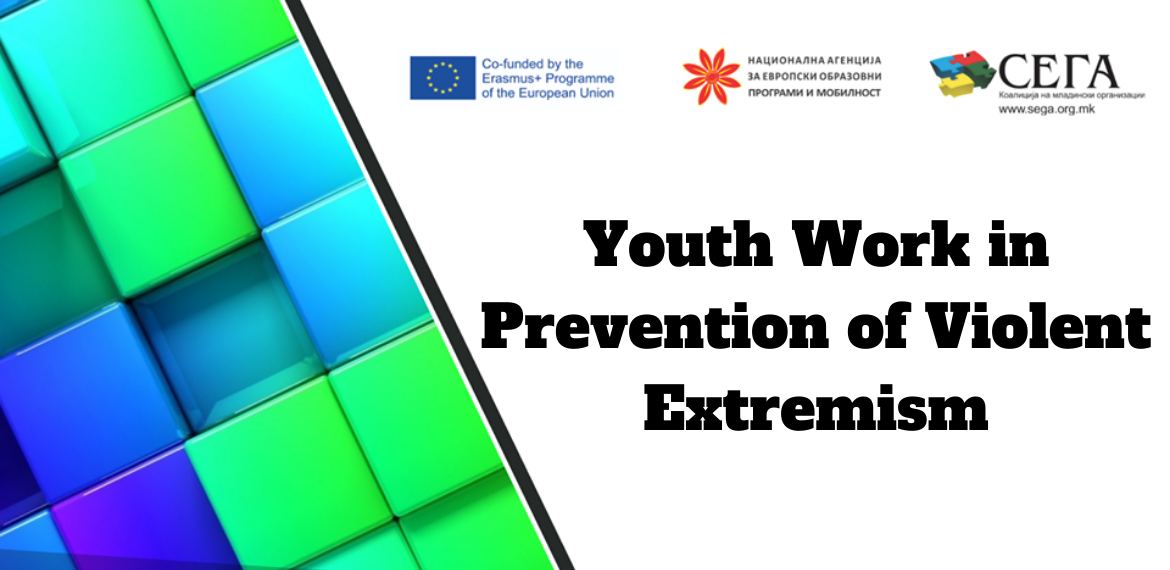
Youth Work in Prevention of Violent Extremism
Start: 01-03-2019 - End: 31-07-2019
Project Reference: 2018-3-MK01-KA347-059981
EU Grant: 5180 EUR
Violent extremism and radicalization is a denial of democracy and of human rights. Unfortunately in Europe and beyond an increasing number of young people are being drawn into extremist movements in their search for identity and a meaningful place in society. Profound feelings of injustice and frustration about their social exclusion are among the main root causes contributing to young people’s vulnerability, and increase their willingness to adhere to extremist, sometimes violent groups, which offer an apparent social purpose to them. In order to effectively commit to the elimination of radicalization and extremism, it is crucial to invest more in prevention measures targeting young people. Youth work is often challenged to respond to the rising extremism in Europe. Prevention of radicalization is one of the priorities of the Erasmus+ Programme.
Young people are an important focus in the prevention of radicalization as they can be a very vulnerable group. Some particularly vulnerable young people are difficult to reach. Youth workers and other practitioners working with young people in social settings should be involved, to detect early signs of radicalization and to offer alternatives. They can also be positive role models or mentors. Youth workers are trained and experienced in working with youngsters on many problematic topics (drugs, sexual exploitation, gambling, gangs) and can use these skills to contribute to the prevention of radicalization Through building positive relationships, youth workers play an important role in supporting the self development of young people. However, youth workers often lack effective tools and strategies to deal with extremism and violent radicalization in their everyday practice. This project had an aim to contribute to the national efforts for improvement of strengthening of the capacities of the state and local institutions for addressing and preventing violent extremism, also to equip youth workers and young people to recognize the type of violent extremism and to find suitable ways of prevention together with the local and national institutions.
In this field Republic of Macedonia prepared National Strategy for preventing violent extremism (2018 - 2022) and also created National committee for prevention of violent extremism. But still, without any doubt, the population which was most affected by violent extremism was youth.
The main aim of the project was:
- Young people and decision makers to become aware of processes and risks leading to extremism and radicalization and be empowered to engage in anti-extremism efforts both individually and collectively at national level and within their local communities.
The two specific aims of the project were:
- To find useful insights and opportunities for combating violent extremism by empowering youth to be change-makers in their own communities
- To explore the concept of violent extremism among youth
Also, this project was in compliance with the EU priority for structured dialogue with young people, social inclusion, which target youth participation. Since Macedonia is striving towards EU membership, the structured dialogue should be fostered and applied in all spheres of political life in Macedonia, and particularly on youth issues. Through this project SEGA promoted this method to the wide stakeholders and prepared the ground for further developments related to Structured Dialogue.
At the very beginning SEGA organized national meeting with decision makers from the following institutions: Ministry of internal affairs, Ministry of foreign affairs, the National committee for preventing violent extremism, different educational institutions, local self - governments etc, in total 20 participants attended on the event including one facilitator and staff from SEGA.
After the event SEGA organized local discussion with young people in 10 different local communities. Each local consultation event was attended by 15 young people from different backgrounds, therefore young people included in Youth NGO activities, young people members of Councils of youth, young scholars from secondary schools and students from universities.
The main event of the project was a 3 day National workshop with decision makers and young people, in total 40 participants. The final result of the workshop was the "Position Paper with recommendations for PVE", which was disseminated to the local and national institutions in R. Macedonia.

